Mary Hoffman's Blog, page 2
February 15, 2021
Falling out of love
This is a terrible subject for the day after Valentine's! But I meant to post it last week when the dangers of blogging over a house move were brought home to me by BT being about to cut off my phone, email and Internet, because they had confused the new address with the old one! Many hours on the phone later and it is resolved and everything works.
What we have this week is book- or CD- shelves being installed in five rooms. Huge quantities of material have arrived and two men are laying sheets of cardboard in the hall and plastic on the stairs. This makes for somewhat distracted posting but at least the electrician is not here today, cutting off power or broadband.
I am currently without a study and working on the dining table (brings back memories) but my garden office is being painted this week and its bookshelves installed the week after. Perhaps by the spring normal service will be renewed at Grandma's.
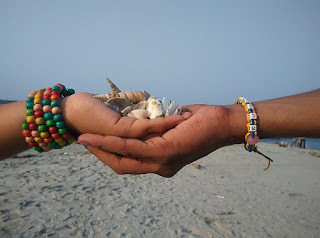
Anyway, back to falling out of love. You may have seen recently reports of a study, which used couples' messages to each other on Reddit to analyse if you could tell a relationship was breaking up months before it actually disintegrated. (I have tried to gain access to the original research paper as all the print media are clearly working from a Press Release, but it wasn't to be. I need a user name and password which my "institution" could provide if the London Library were answering the phone, but instead it is getting on with the more important business of sending me books).
Sarah Seraj is an Psychology PhD student at the University of Austin in Texas, who, together with Kate G. Blackburn and James W. Pennebaker, looked at a million messages between couples on Reddit and saw how the language of them changed over a period before a break-up (the team found 6,803 people who admitted going through a breakup, on the subreddit r/BreakUps. They then tracked their other Reddit posts a year before and after the breakup to see if there were any hidden signs of what was about to happen - looking at posts where they talked about all types of subject matter, not just the posts about their relationships).
I wish I could say that their findings would enable the more apprehensive of you to look at text messages, WhatsApps or whatever and have your fears confirmed or rebutted that things in your relationship were not going well. But it's not as straightforward as that.
Seraj says the main changes are in the use of prepositions, pronouns and articles but these changes can be so subtle that even the poster, let alone the recipient, might not know yet that the relationship was heading for the rocks.

So - to the changes. There is an increased use of "I" and "we" pronouns. "Would," "should," "result" and "because" also become more common. There is an increased use of "very," "really," "no" and "never." But other "functional words," like “a”, “the”, “in” and “at” fall off, indicating a loss of logical thinking.
You could try plotting these changes against recent communications from a loved one but the research offers no advice on how to reverse the changes. Maybe you need to keep an eye on the pronouns and start putting the articles back in?
 Here is my poem for yesterday:
Here is my poem for yesterday:Roses are red
Violets are mauve
We go together
Like Brighton and Hove
Word of the week: (vaccine) passport
There are much talk of a "vaccine passport" at the moment. It seems a bit of a misnomer, since this document on its own would not get you across any border. The word comes from Old French "passe-port" (c.1500), a document that would enable the holder to pass through a seaport.
The vaccine passport, on the other hand, might grant you access to shops, festivals and other venues. There is confusion in the Cabinet about whether such a thing will ever exist but there is an App in development and I wouldn't be at all surprised.
So if we ever get to travel abroad again, we might be asked for both our passports, the one to confirm our identity and the one that shows we've had - presumably two - vaccinations.
February 9, 2021
No post this week
Grammar Grandma is not posting this week, owing to a string of domestic crises and problems with BT.
Sorry.
February 1, 2021
School Grammar
Not Grammar Schools but the kind of grammar being taught to Primary School children, which is different from the grammar taught to their parents and grandparents. (Actually, if my experience of raising three daughters in the 1980s and 90s is anything to go by, parents probably weren't taught any grammar at all). It is also different from anything a linguist would recognise.

Last week Michael Rosen wrote an article in the Guardian in the form of an open letter to Education Secretary Gavin Williamson. Now, Michael Rosen is a recent survivor of the Corona virus; he nearly died and suffers from a range of Long Covid symptoms and side effects. There has been an overwhelming wave of love and support for him during and after his illness and, though he might hate the idea, this accomplished, versatile and prizewinning writer is now something of a National Treasure - a sort of literary Captain Tom Moore. As well as producing his bestselling books, poetry and memoirs and YouTube videos with a huge following, Mike presents Radio 4's Word of Mouth programme and is already back in the metaphorical saddle doing that again.
All this could mean that Williamson might take note of what he said but, whether he did or not, Mike makes some excellent points: It's only now that so many parents are home schooling their children that they are realising how "the primary curriculum now includes all this so-called grammar, which to many of us is a package of outdated, rigid, misleading, prescriptive, disputed terms, all based on the false assumption that “grammar” is either right or wrong."
"So-called grammar" is spot on and one of the most made-up things about it is the dreaded "fronted adverbial," the meaning of which many much-published and highly-educated people do not know. (Does Gavin Williamson know?)
There is nothing wrong with having a language-with-which-to-talk-about-language. It is, after all, what this blog is about. There is Descriptive Grammar, which is what the discipline of Linguistics is about and Prescriptive Grammar, which tells you what is right and what is wrong.
It is worth re-stating here that Grammar Grandma is concerned with what is used in Standard English, while acknowledging the many differences in dialect, slang, register and idiolect. If you use those variants, that is completely OK, but you might find it useful to know what SE does differently, for occasions when you want to use the formal language of a job application, UCAS personal statement, etc.
(It's the same as "translating" a family word in a context outside the family. I have to remember every week that Sainsbury's will not understand "squinges" or "nubbles" if I type them in my order).
Michael Rosen's point is that Primary Schools are not only teaching Prescriptive grammar but are then going further and pretending that this will make you a better write: "Somewhere along the line – have you noticed? – these grammatical features turned into instructions to children on how to write. So now, I gather, they have to create sentences using fronted adverbials, relative clauses and expanded noun phrases – preferably after a preposition."
It seems to me there is nothing wrong with teaching what an adverb is and noticing that where it appears in a sentence might change its emphasis but why on earth make up a new name (I have the same problem with "phonics") and then ask children to use lots of them in their writing?
Wouldn't it be better to look at how interesting writers make a book inviting and exciting by choosing a superbly right word or making up a new one or yes, even putting an adverb right up there at the front? I would place a large bet that no good writer every wrote a good book - or even a good sentence - by thinking "I must put in lots of fronted adverbials."
This is why children thrill to the poems and stories of Michael Rosen and no-one has ever felt the slightest frisson while listening to Gavin Williamson or any other Education Secretary (Nicky Morgan, Michael Gove, Kenneth Baker? - we've had a few doozies)

Word of the week: vaccination
On Saturday, I went, an hour after my husband, to our new local GP Practice to be vaccinated against Covid-19. And a very well-organised procedure it was too. But I started musing on the word, which clearly begins with a cow. Apparently it is because the first "vaccine" (for Smallpox) was developed from cowpox and "vacca" is Latin for "cow."
You could use "innoculation" or "immunisation" instead but "vaccination" is certainly the popular word for it now and "vaccine" a useful word for what you are vaccinated with. I saw no cattle at the health centre.
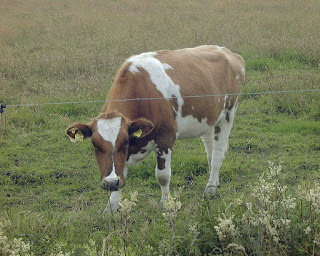
January 26, 2021
A word to the wise
Just word of the week this time, as I have an electrician working in the new house and he often has to turn the router off. I hope to return to normal service next week.
Word of the week: Lockdown learning
Not specifically the BBC's new platform to help school students, which I applaud, but online learning in general. Have you tried it and how do you get on with it?
I registered for Oxford University Department of Continuing Education online course on the Architecture of English Cathedrals. It officially started yesterday and is all online: no Zooms, no Teams, no face-to-face. I got my login details soon after 9am, filled in my profile, got on to the course through the Portal but I might as well have tried entering through my wardrobe.
I went to the Introductions Forum and there was no-one there but me and e-tumbleweed. In the course of the day others arrived and this morning I found a whole new forum discussing the themes of the first unit. It will be fine. But I take my hat off to all those students and teachers trying to teach and learn in this new way.
Of course lockdown learning doesn't have to be digital. I did retrieve some of the losses of yesterday by reading a chunk of one of the set books, which felt more comfortable because familiar. We hear all the time about people who have used one or all of the three UK lockdowns to learn a new skill - a foreign language perhaps, a new-found gift for cordon-blue cookery or at least baking sourdough loaves and banana bread. Some have written a whole book, bought a dog, made a baby.
But the online community is also full of exhortations to be kind to yourself and not worry if you have spent the time lolling about but count it as a win if you have got washed and dressed every day. This applies to adults and children, with a strong emphasis on survival and sanity.
Still, you could always decide to learn more about grammar. See you next week.
January 18, 2021
Just the article
I've talked a lot about vocabulary recently so let's so back to actual grammar. A friend came up with a fascinating query about the definite article.
She (British) was having an article published in an American journal in which she referred to "the Cromwell Road" in London. The editor queried it. "Why not just Cromwell Road?" This led to quite a discussion on Facebook. A native English-speaker living in London would know that it should be "the Cromwell Road" but not "The Oxford Street," for example.
 The Natural History Museum on the Cromwell Road, London. Credit: Txllxt TxllxT
The Natural History Museum on the Cromwell Road, London. Credit: Txllxt TxllxTAnd while we are about it, what a lot of words there are for thoroughfares to start with: Road, Street, Lane, Mews, Avenue, Yard, Passage, Alley, Gardens, Square, Court, Place, Close, Terrace, Park - can you think of any more? And plenty that are a single word, like Piccadilly, Angel, Albany. You'd say "the Angel" but not "the Piccadilly."
The question is: how do you know which is right? And how can a learner of English as a second language possibly work out which is which?
Several respondents mentioned this habit was common in Oxford - "the High," "the Broad," "the Turl" but absent in Cambridge; you'd never say "the King's Parade."
Another said it's also true of larger geographical divisions. We say "the West Country," "the Lake District" but not "the East Anglia." She had been a Royal Literary Fund Fellow and said that at the RLF they had tried to work out a good rule of thumb for ESL students but could come up only with guidelines which had lots of exceptions.
It does seem as if this quirk had to be learned for each example and imagine how difficult it must be for a non-native speaker whose own language doesn't have any articles, like Chinese, Japanese and Korean.
Many European languages not only have definite and indefinite articles but they are gendered (grammatically) and vary in number too. French has "le" and "la" before masculine and feminine nouns but they are both "les" in the plural. Italian has "il" and "la" but distinguishes gender in the plural too: "i" and "le." (And there's a special definite article "lo" (plural "gli") which occurs before masculine nouns beginning with an "impure s"!)
This is all hard for non-native speakers. An English friend of ours who lives in Germany and broadcasts on classical music topics used to offer to record separately "die" "der" "das" and so on to be dropped into his contributions (he has lived there over thirty years now and taken German citizenship, so presumably has his articles sorted).
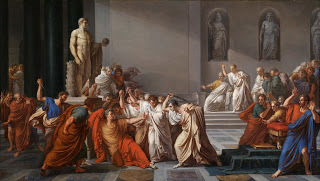
Death of Caesar by Vincenzo Camuccini
Word of the week: Cut
There has been a "non-binding" (another good word) debate and vote in the House of Commons today about whether to continue the extra £20 a week on universal credit after the end of March. The government introduced this extra money during the first lockdown so it is not strictly speaking a cut if they end it in a couple of months' time but a reversion to what UC was before the pandemic.
However, for people struggling on the breadline, it will certainly be perceived as a cut because their weekly funding will decrease and they will feel the loss of every pound.
And since it comes after a decade of actual cuts it will be felt as just another - maybe the unkindest cut of all, as Mark Antony characterised Julius Caesar's stab wound from his friend Brutus, in Shakespeare's play.
My husband usual to work in local government and says that "cuts" were never described thus; they had to be called "savings." Instead of a painful wound inflicted by those with more power on those with less, the word implies thrift, good husbandry, an aspect of a Protestant work ethic rather than a bloodbath. Words matter.
January 11, 2021
Old slang revisited
It was back at the end of last September that all the dailies published articles about how the slang of my generation was incomprehensible to the under-30s. Words not recognised included "sozzled," "bonk,"cad," "wally," "plonk" and "boogie." (Really, who do these young people blame it on?)
It turned out to be a very small sample of only 300 respondents in that age category, out of a total sample of 2,000, so maybe this was not very representative. Columnists such as India Knight of The Times seized on it though, as exemplifying the loss of all light-hearted, fun words and their replacement with dreary ones like "woke", "gaslight" and "ghost"(as verbs). "The grim-faced removal of things that bring joy."
Jilly Cooper said she felt like writing a "plonkbuster" called Sozzled, the word least recognised by millennials.
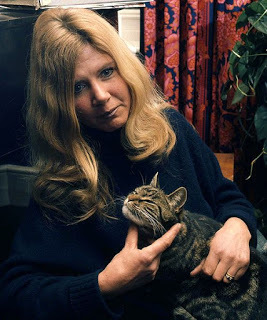 Credit: Allan Warren
Credit: Allan WarrenEven more revealing are the under the line comments, as you might imagine. I have a feeling that this vocabulary reflects a time which might have been more fun for the sozzled cads and wallies than it was for the poor females they wanted to bonk. An image of Terry-Thomas, the gap-toothed would- be seducer was immediately conjured up.
 Author unknown
Author unknownOf course slang words change and tend to be generation-specific. That's a necessary part of each new generation of young people coining words to define and describe their experience of life, which must be different from those of their parents.
Are there words whose passing you regret?
Words of the week: Insurrection, Sedition, Coup
No prizes for guessing why! An insurrection is an uprising against a sitting government; sedition is speech encouraging insurrection and a coup is a successful insurrection that overturns the government.
January 4, 2021
Two nations divided by a common language
I used to think this quotation was from Winston Churchill, he being half-American. But no, this perceptive remark was made by George Bernard Shaw (Americans would say "Bernard").
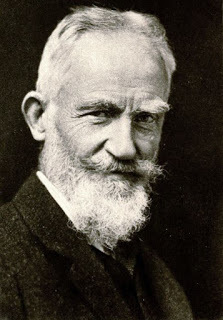
I have been reminded of it twice this week, first by an American acquaintance on Facebook, castigating "The Crown" TV series for making an egregious grammatical error. It was "made" by a young Prince Andrew and addressed to the Queen: "Like other second sons I could mention, I'd obviously be better at it than him." My American friend thinks it should be "than he," with "is" understood. She is right about American English but not about British Standard English, which we can assume HRH was using, where a pronoun takes the accusative form after a preposition. Sorry to have to say that Prince Andrew was correct, even in a work of fiction, but so it is.
I ran into this difference with my American editor for The Falconer's Knot (published by Bloomsbury on both sides of the Atlantic).
The other occasion came from watching my favourite TV cop show, Spiral, which returned on Saturday for its eighth and last season. It's a French series, named "Engrenages" in France, so it has to be watched with subtitles. But who creates these English versions?
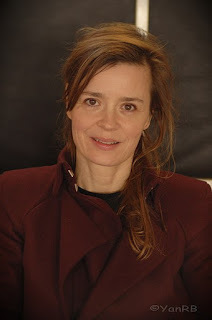
Caroline Proust from Spiral by YanRB
I am sad enough to be part of a Forum discussing Spiral after every two episodes and some of us are quite exercised about the use of American terms in the subtitles, when we are watching it in the UK. There are objections to the use of "laundromat" where a young boy's body has been found, when we would say "laundrette." And then, out of the blue, Laure Berthaud, played by Caroline Proust (pictured above), when asked what she has found out, "says "nothing, nowt." Now, I'm pretty sure that's not part of American vernacular!
When I was working on a project with an American publisher, she didn't know what I meant by someone not being "a patch on his father." But then, I didn't know what she meant by a "blowhard." Truly, divided by a common language.
Word of the week: Challenging
The use of this word is growing, especially during political interviews and briefings. Homeschooling your special needs child is "challenging," Coping with the latest Covid restriction is "challenging." I wish more interviewers and questioners would "challenge" the use of this word, which is rapidly becoming an anodyne euphemism for "extremely difficult" or "impossible." It implies that if people fail to rise to the "challenge," they are somehow failing.
December 28, 2020
Pronouns
On 21st December, Eddie Izzard announced that she would be using the pronouns "she" and "her" in future, because she identified as gender-fluid and was wanting to be in "girl-mode" now. She hasn't as far as I know chosen a new name, just moved to female pronouns.
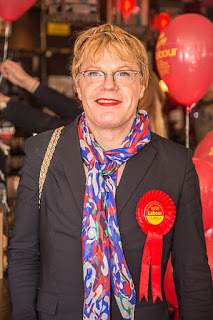
A month earlier Jan Morris, who used to be James, died and received mostly respectful obituaries, having changed both gender and pronouns in the late 60s and early 70s, in a long transition as one of the first high profile transsexuals in this country.
Traditional grammar offers a small group of pronouns which differ in inflection according to number, gender and function in the sentence. But traditional grammar can't keep up with changing ideas about identity and orientation and new pronouns have entered the language:
thon
(Converse, 1884) thon is laughingI called thonthons eyes gleamthat is thonsthon likes thonselfe
(Rogers, 1890) e is laughingI called emes eyes gleamthat is ese likes emselfxe
(Rickter, c. 1973) xe is laughingI called xemxyr eyes gleamthat is xyrsxe likes xemselfey
(Elverson, 1975) ey is laughingI called emeir eyes gleamthat is eirsey likes eirselfper
(Piercy, 1979) per is laughingI called perper eyes gleamthat is persper likes perselfve
(Hulme, c. 1980) ve is laughingI called vervis eyes gleamthat is visve likes verselfhu
(Humanist, 1982) hu is laughingI called humhus eyes gleamthat is hushu likes humselfE
(Spivak, 1983) E is laughingI called EmEir eyes gleamthat is EirsE likes Emselfze, mer
(Creel, 1997) ze is laughingI called merzer eyes gleamthat is zersze likes zemselfze, hir
(Bornstein, 1998) ze (zie, sie) is laughingI called hirhir eyes gleamthat is hirsze (zie, sie) likes hirselfzhe
(Foldvary, 2000) zhe is laughingI called zhimzher eyes gleamthat is zherszhe likes zhimselfsie, hir
(Hyde, 2001) sie is laughingI called hirhir eyes gleamthat is hirssie likes hirselfpeh
(Dicebox, 2012?) peh is laughingI called pehmpeh's eyes gleamthat is peh'speh likes pehselfze, zir
(anon., c. 2013) ze (zie, sie) is laughingI called zir/zemzir/zes eyes gleamthat is zirs/zesze (zie, sie) likes zirself/zemselffaefae is laughing I called faerfaer eyes gleam that is faersfae likes faerself
Here the sheer range is dazzling (I took the chart from Wikipedia). And there is no clue to what recent gender-identities they relate to. Non-binary, gender-fluid, pansexual, intersex, transgender people might choose to use one of the above, use traditional singular pronouns or opt for the very versatile "they, them. their" choice.
The problem is the lack of universal agreement, with such a lot of choice. But there is a movement now for people to introduce themselves by pronoun as well as name: "I'm Mary; I use she and her pronouns," "My name is Sam; I use they and them pronouns." This can only be helpful.
The new pronouns are not "gender-neutral" but "non-binary."
 Word of the week: Granularity
Word of the week: GranularityAccording to the Cambridge dictionary this can mean: the quality of including a lot of small details. "Granular" and "granularity" has become extraordinarily popular with politicians in the run up to the UK/EU Brexit trade deal.
December 14, 2020
No Wifi
Grammar Grandma moved house on Friday and is having WiFi installed so no post today. She hopes to be sorted enough to post next Monday. Please send your words of the week/month/year. She is wondering about "granularity."
December 7, 2020
Tom Lehrer knew it all decades ago
One of the presents I gave my husband for his birthday last month was a CD of Tom Lehrer songs. It was surprisingly difficult to track down one with enough of the songs I remembered from the 60s: National Brotherhood Week; the Vatican Rag; the Masochism Tango.

We listened to it in the car on a long journey yesterday. Songs about pollution and VD seem remarkably topical. But there's a plethora of tracks about WW3 and nuclear warfare - We'll all go together when we go; So long Mom (I'm off to drop the bomb); Who's next? and Wernher von Braun - conjuring up memories of the fears I had growing up and why I joined CND as a teenager.
All this was much as expected but the second half of the disc has songs I never about, written for an educational series on PBS.
Since Tom Lehrer, still alive in his nineties, recently made all his lyrics and music copyright free for a few years, I was able to find the words on the Internet.
Here is a song to teach the diphthong "-ou-:"
"I'm a very quiet hound.
I don't bark or run around.
I just lie here on the ground,
With my head upon this mound.
No one knows where I can be found.
If they knew, then they'd be bound
To come and take me to the pound.
That's why I don't dare make a sound. "

I may have told you before that from 1977 to 1995 I was the Reading Consultant to BBC Schools series Look and Read. Eighteen very good years. We had a little character called Wordy to sing songs written by people like Gordon Snell and occasionally myself. When I took over from Joyce Morris in 1977, recommended by her, the series concentrated largely on phonics. Words like sing and ping and looking would be clustered together solely on the grounds of sound.
When I joined, I moved the emphasis to meaning, so that the "-ing" would be taught as a morpheme, conveying the sense that something was going on. We had a song with the cartoon character Bill the Brickie, singing : Why don't you build yourself a word?/Build yourself a word with an "-ing"/ To show it's happening.

But we did do some songs about sounds and I remember writing the -ar- song (Dog detective is chasing ar/what a wonderful thing!.) And there was the "S+T+R" song from Badger Girl and "I'm listening, I'm listening/for an -ow- inside a tower" from Dark Towers (RIP Peter Mayhew, who was our Tall Knight).
Anyway, the minute I heard the -ou- song, I realised Tom Lehrer had done it all before, about twenty years earlier!
(You can find most of the Look and Read songs on YouTube - but there is a scurrilous version of Bill the Brickie, I should warn you!)
Mary Hoffman's Blog
- Mary Hoffman's profile
- 591 followers



